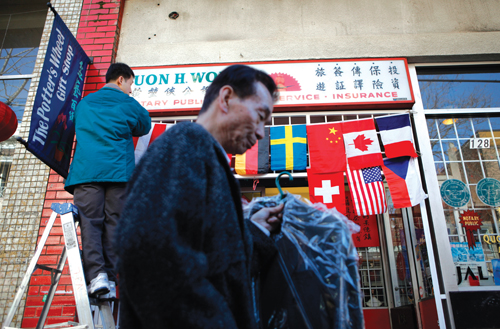
Gift shop owner George Mar, left, hangs flags as he opens his shop in Chinatown in Vancouver, British Columbia, Thursday, Feb. 18, 2010. The Olympic opening ceremony celebrated Canada’s aboriginals and French-speakers, but gave little hint of Vancouver’s huge, dynamic Asian population. Dismayed civic leaders are pleading for a different story at the closing show. (Photo by Jae C. Hong/AP)
By David Crary
The Associated Press
VANCOUVER, British Columbia (AP) — The Olympic opening ceremony celebrated Canada’s aboriginals and French speakers, but gave little hint of Vancouver’s huge, dynamic Asian population. Dismayed civic leaders are pleading for a different story at the closing show.
“It was a slap in the face,” Indo-Canadian activist Sukhi Sandhu said, referring to the opening show’s cultural segment. “You’d expect in an event of this magnitude, diversity would be entrenched in every aspect.”
Sandhu and his allies have called on the Vancouver Organizing Committee to ensure that the closing ceremony convey more of the character of greater Vancouver, where Chinese and South Asians comprise 30 percent of the area’s 2 million people.
“Usually, in any Olympic Games, the host city will use the opening ceremony to show the world what that city is all about,” said Peter Kwok, a civic leader in the Chinese community. “They did a good job telling the early history of Canada — then they forgot about today’s Canada, which is multicultural.”
VANOC’s CEO John Furlong addressed the complaints, saying it was a “complex challenge” to portray Canada’s ethnic mosaic. He indicated that it was too late to modify the closing ceremony, but suggested that by the end of the show, there would be no doubt “who we are and who is here.”
Indira Prahst, a sociology instructor at Langara College who serves on Vancouver’s multicultural advisory committee, said that the damage was already irreparable.
“In my opinion, it’s too late,” said Prahst, of mixed German and Indo-Canadian background. “We should have had a chapter on immigrants in the opening ceremony. … When we have a stage to showcase our multicultural society to the world, why are we invisible?”
The government-subsidized Canadian Broadcasting Corp. carried a report about the controversy on its website, and it generated hundreds of comments — many from Canadians living outside British Columbia who characterized the Vancouver ethnic leaders as whiners.
However, Henry Yu, a history professor at the University of Columbia, said the rift was serious and could leave scars.
“What’s stunning to me,” he said, “is that during the whole three- or four-year lead-up, no one even noticed during the planning that this might be an issue.”
The opening ceremony included an extensive tribute to Canada’s aboriginal people. The national leader of the Assembly of First Nations later praised the show as an important step forward.
Sandhu and other critics were outraged that none of the 13 was what Canada classifies as “visible minorities” — Asians, Blacks, and other nonwhites.
Alden Habacon, founder of an online magazine called Schema that covers multicultural trends, said he took note during the opening telecast when the Olympic flag emerged “carried by an all-white cast of Canadian heroes.”
“Don’t get me wrong — I love all of them,” he wrote. “The point is, if you were watching the opening ceremonies on television, you wouldn’t even know that it took place in the most Asian city in North America.”
“The Chinese community was 100 percent behind the games … and we cheered when Canada won its first gold medal,” civic leader Jun Ing said. “But the opening ceremony was not inclusive enough.”
In Chinatown, some stores have put Canadian flags in their windows, and the New Town Bakery — which specializes in steamed buns — has “Go Canada Go” banners hanging from its marquee.
In the suburb of Surrey, home to a large Indo-Canadian population, radio talk show host Harjinder Thind said many of his callers have been venting their anger at the opening ceremony.
“They think they are Canadian — they were born here,” he said. “They feel betrayed that none of the Chinese, none of the East Indians were even shown.”
One Asian with a different viewpoint is Borvonan Vattanawong, 21, a native of Thailand and student at Simon Fraser University who was part of the Olympic torch relay on Feb. 11 at his campus near Vancouver.
“We saw all these people lined up, kids and parents — all the communities came together to celebrate,” he said. “It was seeing the community at its best.” ♦




hallo, im from turkey so my english knowledge isnt that amazing. Please dont blame me. I read blogs to make my english better and i just want to say that your blog was perfect readable for me, because the english is really clear-thinking and all the posts are perfect readable. I will keep on reading it, to improve my english even more. Thanks a lot 🙂
Asians are not united. That is why they are treated badly.